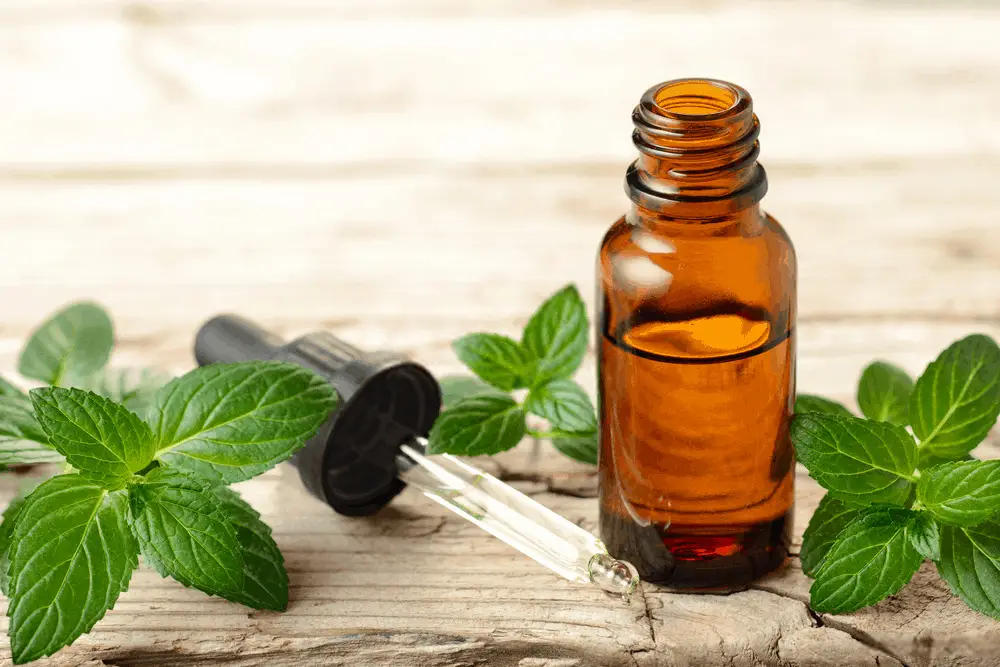Are you suffering from eczema and want to go natural for your treatment? Well, peppermint oil for eczema sufferers is something we will explore in this article.
Eczema is a well-known skin condition that affects more than half of the population, male or female, young and old. It is a chronic illness where the skin has patches that are inflamed, cracked, red and itchy. Sometimes, when the condition becomes so severe, blisters may occur. The word eczema is used commonly for atopic dermatitis, which is the most common type of eczema.
There are many other types of eczema aside from atopic dermatitis; they include, contact dermatitis, nummular eczema, dyshidrotic eczema, stasis dermatitis, and seborrheic dermatitis. Each of these types of eczema can have different symptoms that range from inflamed skin to unpleasant and oozing scabs.
Usually, people who are infected by eczema use over the counter lotions and creams to keep their symptoms under control. However, in some cases, people with eczema cannot tolerate those basic formulas from this temporary relief. According to dermatologists, this is because the items they used may contain other ingredients that can harm the skin. For these patients, many doctors recommend using natural oils.
Natural oils or essential oils like peppermint oil have been proven to contain anti-inflammatory and stress-reducing properties which can provide relief for patients who are suffering from the symptoms.
Peppermint oil is a natural oil that has anti-microbial, antibacterial, and antifungal components. These properties are therapeutic for eczema sufferers because it inhibits the growth of the bacteria that causes skin flare-ups. It is beneficial for many skin conditions with symptoms of inflammation like eczema because of its anti-inflammatory properties and antifungal activities. Peppermint oil also works to cool and calm inflamed skin and helps speed up the skin’s natural ability to heal.
What is Eczema?
Eczema is another chronic (long-lasting) skin condition that tends to break out periodically. It’s common among children but it can also occur at any age. Having eczema is irritating because it makes the skin itchy and red and for some, it is accompanied by hay fever and asthma.
There is no cure for eczema, only treatments to manage the symptoms as measures to relieve itching and to minimize new outbreaks. Some examples of these temporary solutions are to avoid using soaps with potent ingredients, regularly moisturizing the skin, and by applying ointments and medicated creams as needed in moderation.
Symptoms
There are many kinds of symptoms for atopic dermatitis depending on the person’s age. As atopic dermatitis is common among infants, the most visible signs are scaly and dry patches on the skin that often become intensely itchy.
Many people develop eczema before reaching the age of five and half of these people will have these symptoms in their adulthood. However, we cannot generalize for all those who have experienced eczema; some can have different symptoms from when they were children. It’s also noted that the flare-ups can worsen for certain periods and then after some time, they will clear up and improve.
Among infants and children under two years old, atopic dermatitis is characterized by rashes on the cheeks and scalp that usually bubble up and leak fluid. It is incredibly itchy and may interfere with their sleep. Skin infections may occur from scratching and rubbing.
For young children, the rashes usually appear behind the folds of the knees and elbows and around the neck, wrist, ankles and the crease between the buttocks and legs. These rashes are bumpy and can be light or dark in color. It may thicken too, this is called lichenification, and it can develop into knots with a permanent itch.
In adults, the rashes commonly appear in the neck area, elbows, and knees or cover much of the body but more prominent on the face, neck, and around the eyes. It’s generally accompanied by itchiness and dry skin and much scalier than those of children. The severity of your eczema will determine exactly how it looks on your body.
I have written an in-depth article on whether or not children will “outgrow” eczema and the chances that you won’t have it anymore in your adulthood. Check it out here.
Causes
After all these years, what’s causing eczema still baffled many experts. Their theory is that eczema is developed through a combination of environmental and genetic factors. It’s also not contagious. Children, however, are more likely to have eczema if their parents had eczema or other atopic diseases.
Other factors including environmental ones can also cause flare-ups of eczema including irritants like shampoos, soaps, detergents and disinfectants, allergens like dust mites and all its kinds, microbes, a hot and cold temperature that are extreme, perspiration, foods like eggs and dairy, stress and hormones, especially amongst women.
Treatment
As we have mentioned earlier, there is no known cure for eczema. The remedies available for the condition are meant to soothe and heal the infected area and prevent the symptoms. There are many available creams and lotions and doctors will provide a treatment plan based on the patient’s symptoms, age, and general wellness.
Peppermint oil has become a popular treatment amongst eczema sufferers, especially for those severe cases, as it provides a soothing and healing effect on the affected areas.
Peppermint oil
Peppermint, Mentha Piperita, is a widely used herbal plant. It is known for its medical and culinary purposes that dates to the Greeks and the Romans. It is used in many forms, as an oil, leaf extract, or leaf water but among them, the oil form is the most versatile. This plant is known to have beneficial effects on the gastrointestinal system, but the more traditional use is for its antifungal, antimicrobial, and analgesic properties.
The plant, a fragrant perennial herb with purple flowers is easy to grow and propagate. The leaf is common and versatile. It can be added to drinks, made into tea, or added to different dishes and condiments. The peppermint leaf tea has antiviral and antimicrobial properties, a potent antioxidant with anti-tumor properties and an anti-allergen as well.
Much of the studies and research are however centered on the effectiveness of peppermint oil in natural healing and other treatment. These studies proved that this specific essential oil contains a significant amount of antiviral and antimicrobial components as well as anti-allergenic, anti-itch, and painkilling action.
For people suffering, peppermint oil for eczema can be an essential all-natural treatment. It has a soothing and calming effect (anti-inflammatory), anti-fungal, antibacterial and antimicrobial properties that make it one of the most effective treatments to calm the effects of eczema and it encourages the skin to heal faster.
The Science behind Peppermint Oil
Menthol is a monocyclic alcohol that is naturally derived from the Mentha pipera (peppermint) leaves. It has been associated with many health benefits. In the most recent studies, it has been concluded that menthol, when used as a topical treatment for eczema, has an antibacterial, anti-inflammatory, and anti-fungal property. It was also found that the healing was faster due to the menthol content.
Because of its high menthol content, its aroma, and its overall healing properties, peppermint oil for eczema is highly recommended. The menthol component immediately cools down the hot, feverish skin, which is common among eczema sufferers to provide immediate relief.
Its antiseptic qualities can help disinfect the skin, keep it protected from the skin-irritating microbes which are the culprit for severe itching. The anti-inflammatory properties, on the other hand, can help reduce the inflammation and redness, the known symptoms of the skin disease.
Benefits of Using Peppermint Oil
There are many benefits of using peppermint oil to relieve the symptoms of eczema. This includes the following:
Cooling and soothing
Because the essential oil has significant menthol content, it can help cool down the overheated and feverish skin, a characteristic symptom of eczema. When the affected area is cooled down, it provides a soothing effect to the patient.
Anti-itch
The continuous itch that eczema can cause can be overwhelming. When peppermint oil is diluted into a cream or applied directly to the patchy area, it can alleviate the itch instantly. It also has an antiseptic property that cleans the areas and keeps microbes away to prevent further itching.
Anti-inflammatory
Eczema, especially in adults, is characterized by redness and inflammation. Because of the anti-inflammatory effects of peppermint oil, it can help reduce these symptoms drastically.
Relieves the Pain
Another great property of peppermint is its analgesic action. When combined with the numbing effects of menthol it contains, the essential oil can help in pain management brought about by the itchy rashes from eczema.
The inherent properties of peppermint oil make it a natural, beneficial, and an overall great treatment for skin conditions that manifest as inflammations like in the case of eczema. It has a natural antibacterial, anti-fungal, and antimicrobial properties that inhibit the growth of microbes that cause further irritation and helps heal the breakouts.
Related Questions
1. What happens when you drink peppermint oil?
When used as advised, peppermint oil can be contained in dietary supplements. It is advisable to seek the advice of your doctor before taking peppermint oil.
2. Can peppermint oil regrow hair?
Peppermint oil is a vasodilator and known to increase blood flow. When you promote blood flow to the undernourished hair, this can improve hair growth and prevent hair loss.
Recent Posts
Eczema vs Bed Bug Bites: How to Tell the Difference? (W/ Pictures)
Trying to figure out the difference between eczema vs. bed bug bites? If your skin is covered in itchy red welts or splotches, your first thought might be that you are dealing with eczema. It is,...
Best Sunscreen for Babies With Eczema: Top 13 Picks (Updated 2020)
With summer always on the verge, it’s never too early to start looking for the best sunscreen for babies with eczema. Oh yes, even though winter is on the rise at the time of this article...

